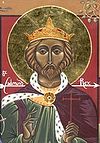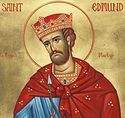

| Previous day | Next day |
| Old Style
November 20
|
Saturday |
New Style
December 3
|
|
25th Week after Pentecost.
Tone 7.
Nativity Fast. |
Fish, wine and oil allowed.
|
![]() Forefeast of the Entry of the Most Holy Theotokos into the Temple.
Forefeast of the Entry of the Most Holy Theotokos into the Temple. ![]() St. Gregory of Decapolis (816).
St. Gregory of Decapolis (816). ![]() St. Proclus, archbishop of Constantinople (446-447).
St. Proclus, archbishop of Constantinople (446-447).
Martyr Dasius of Dorostolum in Moesia (284-305). Martyrs Eustace, Thespesius, and Anatolius, of Nicaea (312). Hieromartyr Nerses, bishop of Shahrqart (Kirkuk), and his disciple Martyr Joseph, and those martyred with them in Persia: Hieromartyrs John, Shapur, and Isaac, bishops of Seit Selok; Martyrs Guhshtazad, eunuch, Mari, Sasan, Tima, Noah, and Zaun, of Lashom; and Bautha, Denachis, Thecla, Dinaq, Tatun, Mama, Mazakya, Ana, Abyat, and Hatay (343). Venerable Diodorus the Abbot of Yuregorsk (1633). St. Parasceva (Rodimtseva), abbess of Toplovsky Convent (Simferopol) (1928).
New Hieromartyrs Macarius (Karmazin), bishop of Dnepropetrovsk, Arsenius (Dmitriev), abbot, of the Tikhvin Monastery, Eutychius (Kachur), abbot, of the St. Marcian Skete (Ukraine), Hilarion (Pisarets), hieromonk of Glinsk Hermitage, Alexis Amanov, archpriest, of Zaraisk (Moscow), Vladimir Medvediuk, archpriest, of Yazvishche (Moscow), Alexis Nikatov, archpriest, of Ignatovo (Moscow), John Savr, archpriest, of Tikhvin, and Alexander Sakharov, archpriest, of Petrovskoye (Ryazan) (1937). New Nun-martyr Ioannikia (Kozhevnikova), abbess of the Convent of the Entry of the Theotokos (Tikhvin) (1937).
St. Isaac, bishop of Armenia (440). St. Theoctistus the Confessor, of Constantinople (855). Martyr Edmund, king of East Anglia (869). St. Sozomen of Cyprus (12th c.).
Thoughts for Each Day of the Year
According to the Daily Church Readings from the Word of God
By St. Theophan the Recluse

Saturday. [Gal. 3:8-12; Luke 9:57-62]
No man, having put his hand to the plough, and looking back, is fit for the kingdom of God. That is, he who thinks to be saved while glancing back at what he should abandon for the sake of his salvation, is not being saved, is not walking, is not directed toward the Kingdom of God. It is necessary to destroy once and for all everything that is not compatible with the work of salvation. Those who think to be saved see this themselves, but they always put off parting with certain attachments until tomorrow… To suddenly break with everything is too great a sacrifice. They want to give things up in a leisurely fashion, to not stand out in front of others—but they almost always fail. They introduce salvific routines, while the dispositions of their heart remain as before. At first the incongruity is very sharp: but “tomorrow,” and their promises of change shut the mouth of their conscience. In such a manner, with everything tomorrow— always tomorrow—the conscience grows tired of saying the same thing over and over, and at last, falls silent. Here thoughts start to come that things can be left this way. These thoughts strengthen, and then are established forever. An exterior which is outwardly proper is formed, with inner improperness. This is a whited sepulchre before the eyes of God. The worst thing is that the conversion of this sort of person is as difficult as the conversion of those who have become hardened in open sins, if not more difficult… Meanwhile, this person thinks that everything is fine.
Articles
 St. Proclus the Archbishop of ConstantinopleSaint Proclus, Archbishop of Constantinople, from his early years devoted all his time to prayer and the study of Holy Scripture. |
 Martyrs Eustace, Thespesius, and Anatolius of NiceaThe Holy Martyrs Eustathius, Thespesius and Anatolius, natives of the city of Gangra, were the children of a rich merchant. |









